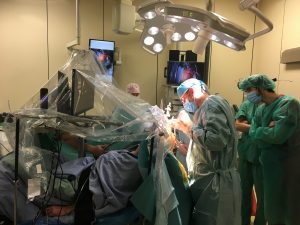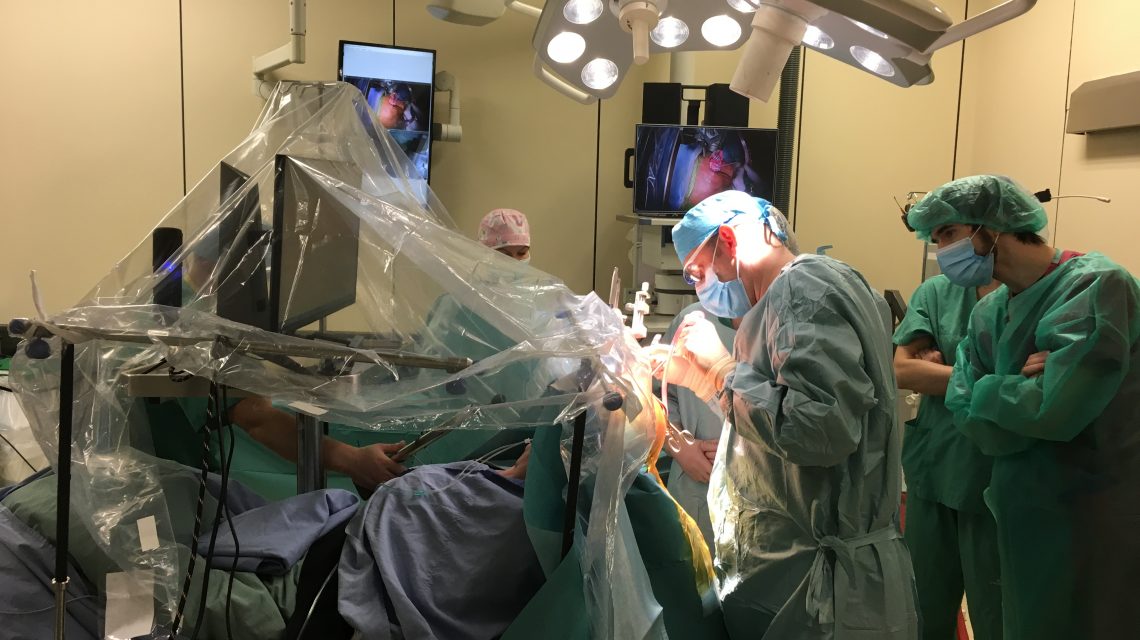First intra-operative recordings in Poland 1 marca 2021 – Posted in: News – Tags: Brain Stimulation, Gdansk, Mayo Clinic, Michal Kucewicz, Poland, Science
 We are delighted to share our next breakthrough with advancing clinical neuroscience research in Poland. This month we have recorded for the first time pupil responses to electrical stimulation in the deep brain structures called the basal ganglia. The recordings were part of a standard therapy for Parkinson’s disease and movement disorders called the Deep Brain Stimulation. In this therapy, electrical stimulation is delivered through special electrodes implanted in the brain of an awake patient performing various motor tasks to assess the immediate effects of the stimulation in the surgery room. We took advantage of this unique opportunity to record and stimulate in the human brain to assess pupil responses with our system for eye-tracking, comprising a special infrared camera and a computer monitor placed in front of the patient during the surgery (as in the photograph from our first experiment in Wroclaw).
We are delighted to share our next breakthrough with advancing clinical neuroscience research in Poland. This month we have recorded for the first time pupil responses to electrical stimulation in the deep brain structures called the basal ganglia. The recordings were part of a standard therapy for Parkinson’s disease and movement disorders called the Deep Brain Stimulation. In this therapy, electrical stimulation is delivered through special electrodes implanted in the brain of an awake patient performing various motor tasks to assess the immediate effects of the stimulation in the surgery room. We took advantage of this unique opportunity to record and stimulate in the human brain to assess pupil responses with our system for eye-tracking, comprising a special infrared camera and a computer monitor placed in front of the patient during the surgery (as in the photograph from our first experiment in Wroclaw).It is amazing enough to see how simple electrical stimulation in these brain structures has an immediate and profound effect on restoring the patient’s ability to move legs, hands, eyes or to speak. To look how the stimulation affects pupil responses and the cognitive abilities to attend and remember presented items is a new unchartered territory that our BME lab is now exploring. With this first patient, we are opening our research to potential discoveries of deep brain regions and stimulation patterns that could have a similar effect on releasing the freedom to move not only in the physical realm of our bodies and the world around us, but even more astonishingly, in the abstract wonderland of our thoughts, memories, and awareness.
All of this is possible thanks to a concerted team effort of neurosurgeons, who plan and decide where exactly to place the electrodes, of neurologists and neurophysiologists who assess where the electrodes are and how to modulate various brain functions with the stimulation, biomedical engineers who develop and assist with the technologies used in these procedures, and neuroscientists like us in the BME lab, collecting and analyzing the data to know how to improve memory and cognition. Since the beginning of the First Team grant in 2018, this has been the most fruitful collaboration between our group at the Multimedia Systems Department of the new BioTechMed Center (Gdansk University of Technology) and the Jan Mikulicz Clinical University Hospital in Wroclaw (Wroclaw Medical University). We are excited to see the first fruit of this groundbreaking, multi-institutional, collaborative work in Poland that will now advance the frontiers of our knowledge about the human brain and mind…

